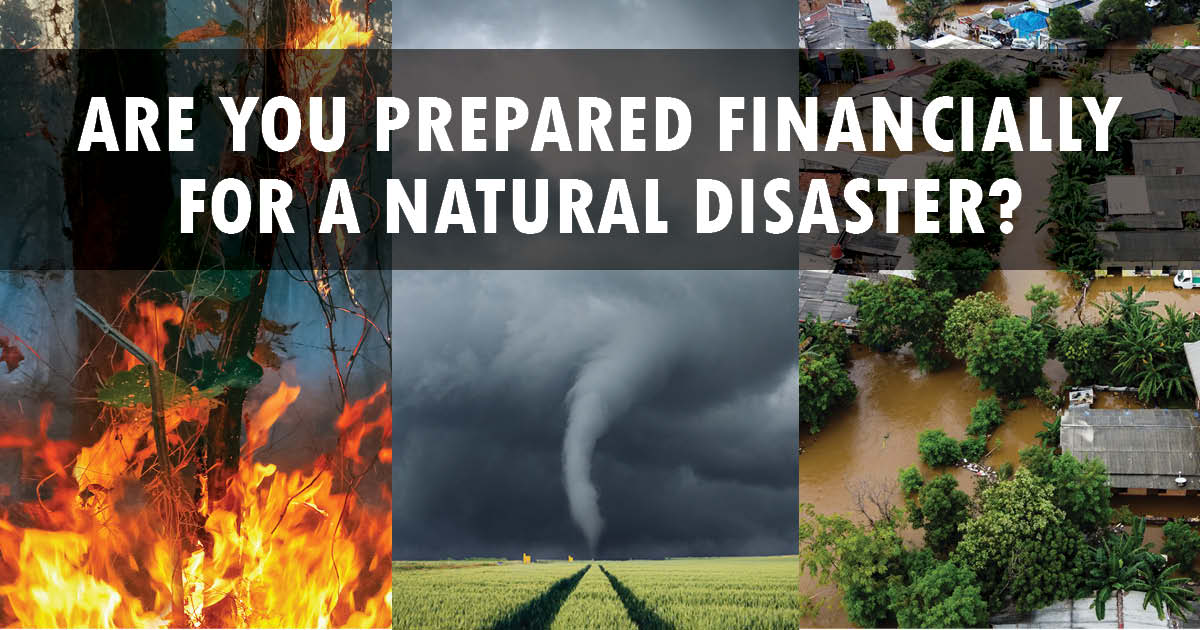Are You Prepared Financially for a Natural Disaster?
Amidst the frequent occurrence of tornadoes, earthquakes, and tsunamis across the globe, countless individuals have witnessed the profound and devastating impacts of disasters. Naturally, our primary concern is always the safety of lives. However, once the immediate crisis subsides, the harsh reality emerges. Many find themselves facing the loss of their homes and cherished possessions. While you cannot entirely prepare yourself against a natural disaster, you can develop your finances so you can quickly recover and get back on your feet once the emergency subsides.

- Safeguard your financial documents on a thumb drive
In times of wildfires, floods, hurricanes, tornadoes, or other catastrophic natural events, your recovery process can be significantly expedited if your crucial financial and estate documents are well-protected. Consider creating an "Emergency Document Kit" by saving essential financial documents, including birth certificates, marriage certificates, wills, deeds, tax returns, insurance policies, and investment records, on a secure thumb drive. Alternatively, assemble a physical kit with copies of these documents stored in a waterproof and fireproof box. For added security, consider digitize your paper documents and store them in a cloud storage environment for remote accessibility.
- Create a visual inventory of valuables
Documenting items of monetary value associated with your property is crucial. Utilize your smartphone or camera to visually record possessions such as cars, boats, and recreational vehicles. Additionally, capture the condition of your home, both its interior and exterior, including landscaping features. Special attention should be paid to any improvements that may enhance property value and assist with insurance claims. Complement these visuals with a list of valuable possessions, including product descriptions, prices, photos, receipts, and any relevant details to facilitate insurance claims.
- Establish a safety-net savings account
While maintaining a standard emergency fund is prudent, it's equally essential to create a financial cushion designated for natural disasters. Consider setting aside funds equivalent to three to six months of living expenses, if not more. Having quick and easily accessible resources can be a lifesaver during the aftermath of a natural disaster. In some cases, experts recommend maintaining up to 12 months' worth of savings in a separate account for these emergencies. Explore U1's savings options and start saving today.
- Cash Options
Cash remains invaluable during emergency situations. U1 provides access to your account through CO-Op Shared Branching with over 5,000 nationwide branch locations and over 2,200 ATMs near your work, home, shopping and travel destinations with the ability to make deposits, withdrawals, transfers, account inquiries and other transactions as if you were at a U1 location.
- Maintain a dedicated emergency credit card
While cash is essential, having a dedicated credit card reserved solely for emergencies is a wise strategy. This card can provide a financial safety net when you might not have access to your wallet, phone, or essential items during a disaster. Eliminate concerns about credit limits or balances when dealing with immediate expenses like fuel for evacuation. Find the right card for your needs.
- Set up auto-payments for important bills
Protect your financial stability by establishing automatic payments for your monthly bills. This precaution becomes critical when access to electronic devices is compromised.
- Review and enhance your insurance coverage
Regularly review your insurance policies, including property, flood, life, and disability insurance, and pay attention to any riders. Make sure you're adequately covered for various disaster scenarios. For homeowners, ensure you have comprehensive coverage, as some natural disasters may require additional policies not included in standard packages.
- Schedule roof inspections
If it's been some time since your last roof inspection, especially for an older roof, consider scheduling one and keep documentation of the passed inspection. Your insurance may not cover roof damage if it's deemed to be in poor condition. Having proof of a successful roof inspection can significantly improve your chances of a successful insurance claim.
After a disaster leaves you without a home or employment, there are avenues to seek assistance:
- File for unemployment: If you're unable to return to work immediately, apply for unemployment benefits. Your local unemployment office or FEMA's website can guide you through the process.
- Explore FEMA grants and resources: The Federal Emergency Management Agency (FEMA) offers critical relief following natural disasters. You may be eligible for FEMA funds, including up to $33,000 through the Individuals and Households Program. These funds can help repair your home or cover temporary housing expenses.
- Leverage the Emergency Financial First Aid Kit (EFFAK): This resource equips you with financial preparedness and offers tips to minimize the financial impact that disasters can have on your life.
Natural disasters can strike unexpectedly, anywhere in the world. Regardless of the specific disaster type, the aftermath can be devastating. While you may have stocked up on essentials like bottled water, flashlights, extra food, and batteries, it's equally important to ensure your financial preparedness for the post-disaster phase. The above guidance can serve as a cornerstone of your financial resilience strategy.
For more guidance on preparing for natural disasters, please visit Ready.gov, where you'll find valuable information, guidelines, and checklists to help you develop your emergency plans and ensure your financial security in challenging times.
Universal 1 Credit Union stands ready to support you in every aspect of your financial journey, including navigating the unexpected challenges posed by natural disasters.
« Return to "Blog"
